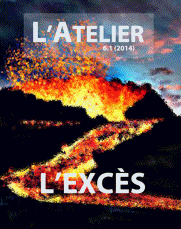L'excès en tous lieux dans l'oeuvre d'Edwidge Danticat
Keywords:
Littérature postcolonialeAbstract
Dépassant les contraintes de l’anglais en l’infusant d’expressions créoles et alternant faits réels et contes du folklore haïtien, le métadiscours de l’auteure haïtiano-américaine Edwidge Danticat permet la surabondance des dimensions historique, politique et personnelle et dépasse souvent l’entendement. Cet article s’attache à démontrer comment l’auteure construit un discours hybride au delà des frontières et transforme l’expérience diasporique en une histoire transculturelle et transtextuelle. Dans toute son œuvre, le réel et l’imaginaire sont souvent exacerbés au sein d’espaces du milieu qui représentent avec une violence démesurée le démembrement des corps, le dépassement des subjectivités et la déconstruction des histoires. Il s’agira d’analyser la mise en œuvre d’une poétique de l’excès illustrée dans « Nineteen Thirty Seven » par la dissolution des frontières, dans Brother, I’m Dying par le chancellement des discours et dans Breath, Eyes, Memory par la fragmentation des corps féminins excédés. Les récits fictifs et non fictifs de Danticat semblent exister au cœur de ces espaces de l’excès où silences, voix et corps s’expriment au delà des maux et illustrent les intempérances discursives de l’auteure. Ses écrits imaginent l’impact des espaces incontrôlés sur les subjectivités et le débordement des lieux de mémoire, soulignant ainsi que « le souvenir a toujours une fonction de re-territorialisation » (Deleuze et Guatarri). Pour Danticat, mémoires et territoires ne peuvent donc s’écrire que dans la démesure, l’outrance et le dépassement des subjectivités meurtries.
Spaces of Excess in Edwidge Danticat’s Fiction
While she writes in Standard English, Haitian American author Edwidge Danticat’s prose is infused with Creole expressions and cultural references belonging to Haitian folk memory. Within her fiction, the historical, political and personal dimensions intermingle and often contribute to defying logic. This article seeks to demonstrate the extent to which the author constructs a hybrid discourse across borders and transforms the diasporic experience into a transcultural and transtextual narrative. Throughout Danticat’s work, the real and the imagined are constantly exacerbated within these in-between spaces which represent, with an excessive violence, the dismemberment of bodies, the transcendence of subjectivities, and the deconstruction of histories. Danticat’s poetics of excess will be enhanced through the analysis of the dissolution of borders in her short story « Nineteen Thirty Seven » and of the fragmentation of overwhelmed bodies in her novel Breath, Eyes, Memory. Danticat’s fictional narratives are constructed at the very heart of these spaces of excess from which silences, voices and bodies can be heard beyond grief. Her stories foresee the impact of uncontrolled spaces on the construction of female subjectivities and imagine the overflowing sites of memory, thus underlining that memory also has “a function of re-territorialization” (Deleuze and Guatarri). In Danticat’s work, memories and territories can only be narrated through excess, overabundance and transcendence of wounded subjectivities.
Published
Issue
Section
License
- Work submitted for publication must be original, previously unpublished, and not under consideration for publication elsewhere. If previously published figures, tables, or parts of text are to be included, the copyright-holder's permission must have been obtained prior to submission.
- Authors of accepted manuscripts will assign to L'Atelier the right to electronically distribute their article, or publish it in any form (Internet, CD ROM, printed copy) but authors will retain copyright and, after the article has appeared in L'Atelier, authors may republish their text (in print and/or electronic form) as long as they clearly acknowledge L'Atelier as the original publisher.


